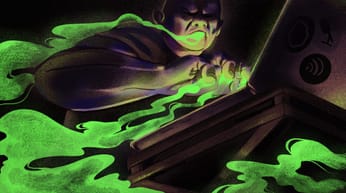
Cracking open The Base
A lot has happened with the neo-Nazi group in the past two weeks. Here's a guide to help you make sense of it.
Hi, and welcome to The Informant, a publication covering hate and extremism in America, written and edited by me, Nick R. Martin.
Thousands of you have already subscribed to The Informant. But if you haven't, please take a moment to do so. It's free and as simple as typing in your email address. You'll be supporting independent journalism and helping take a stand against hate.
Because The Informant is new, I’d love your feedback on what you like and don’t like. Please email me at nick@informant.news. You can also find me on Twitter at @nickmartin.
Cracking open The Base

It’s been an extraordinary two weeks for the neo-Nazi group The Base.
Seven members have been arrested. Its leader has been outed as an American living in Russia. And it has come to light that the group has been infiltrated by both law enforcement and anti-fascists.
In all, the feds say they broke up a murder plot in Georgia, disrupted plans to shoot up a massive gun rally in Virginia, and captured a former Canadian soldier who had been on the lam for months.
The developments have opened up a rare window into the inner workings of a group that has attempted to operate in relative secrecy and that advocates for terrorism and mass shootings to bring about the collapse of modern civilization.
You may remember The Base from my article, “The wrong house,” in the debut issue of The Informant. Two members of the neo-Nazi group got mixed up in a case of mistaken identity in Michigan. They tried to intimidate an anti-racist podcaster but wound up terrifying a random family with a newborn baby instead.
I’m still working to bring you part two of that story. But so much has happened in the past two weeks that I thought it would be helpful to highlight some things we’ve learned about The Base from these developments.
What I’ve put together is a guide of sorts to help you navigate these new details. It’s far from comprehensive, but hopefully it will give you an idea of the enormousness of the situation.
Here’s a rundown of what you’ll find below:
- The group’s founder is an American living in Russia
- The Base was infiltrated by at least three different people
- The group purchased 30 acres in Washington for a training camp
- A massive property in Georgia was used as another training camp
- The alleged murder plot in Georgia was incredibly detailed
- A ‘civil war’ fantasy fueled the alleged plot in Virginia
- Ties to other white supremacist groups
- Two members are talking to the feds
1. The group’s founder is an American living in Russia

He went by the fictitious names “Norman Spear” and “Roman Wolf.” Now, thanks to the investigative reporting of The Guardian’s Jason Wilson, we know that the real name of The Base’s founder is Rinaldo Nazzaro. He’s a 46-year-old American living in Russia who claims to have a background in counterterrorism and homeland security.
The identification of Nazzaro has led to a lot of speculation that he is either a federal or foreign asset and that The Base was either a “honeypot” for the feds or else a Russian-run operation to destabilize the U.S. Another plausible explanation, however, is that Nazzaro is just another in a parade of angry white men to emigrate to Eastern Europe.
Setting aside the speculation, the facts that led to his outing are extraordinary. It started in August with a series of tweets from Eugene Antifa, an anti-fascist collective in Oregon, that exposed the fact that The Base had purchased property in neighboring Washington for the purpose of conducting training camps.
From there, Wilson followed a trail of public records and corporate filings that eventually led him to discover the true identity of “Norman Spear.”
Wilson’s reporting was matched the following day by a BBC report confirming Nazzaro’s connection to The Base and explaining that he now lives in an “upmarket property” in St. Petersburg, Russia.
2. The Base was infiltrated by at least three different people
In December, according to court records, Nazzaro talked to members of The Base about tightening up their methods of communication so that they could try to find out if the group had a leak. They couldn’t just rely on encrypted messaging apps, he told them.
“You can have the most secure app imaginable but if there’s an infiltrator, you’re done,” Nazzaro wrote in the group’s private, encrypted chat.
Nazzaro knew by that point that they had already been infiltrated earlier in the year by a Canadian journalist. The journalist was able to use the information he learned during his short time as a member of the group to identify a military soldier who had been recruiting for the organization in Winnipeg. (Note: I’ll be publishing an interview with the journalist, Ryan Thorpe, later this week.)
What Nazzaro didn’t know, however, was that there were two long-term infiltrators inside the The Base. One was an FBI agent. The other was an anti-fascist.
Court records show that an undercover FBI agent first contacted The Base in July and became a patched member of the neo-Nazi group’s Georgia cell the following month. From then until January 12, the agent remained inside the organization and wound up uncovering information that would ultimately be used in three criminal cases against The Base, including an alleged murder conspiracy.
At the same time, an anti-fascist activist was also embedded inside the group. According to a report Saturday by The Guardian’s Jason Wilson, the anti-fascist was inside The Base for more than a year and ended up leaking chat logs, audio recordings and videos to Wilson, which helped lead to the identification of the group’s founder, Nazzaro.
3. The group purchased 30 acres in Washington for a training camp

Nazzaro reportedly purchased 30 acres of land in Ferry County, Washington, so that the group could hold paramilitary training camps there.
The revelation was part of The Guardian’s article identifying Nazzaro as the founder of The Base, but the Spokesman-Review in Spokane, Washington, followed up by providing even more details about the purchase.
The Spokesman-Review noted that the land was near Republic, Washington, a small city in the northeast part of the state. Republic is only about 25 miles from the Canadian border.
Ferry County property records show a company named Base Global LLC purchased three tracts of land, each one about 10 acres, on December 21, 2018. The company paid $43,000 for the land, the records show. The Guardian was able to tie those purchases to Nazzaro.
There’s reason to believe the group used the land for its training camps, too. An August article by VICE reporters Mack Lamoureux and Ben Makuch noted that The Base released a propaganda video showing members firing shotguns and assault rifles shortly after the group was said to have been planning to hold training exercises in northeast Washington.
Federal court records released last week also mention that members of The Base took part in a training camp in August, but the records only specify that the camp took place in a state other than Georgia.
4. A massive property in Georgia was used as another training camp

A 100-acre property in northwest Georgia was used repeatedly as a training camp for The Base, hosting members from as far away as Wisconsin, according to court records.
The records show the same property was also used for months as a hideout for former Canadian soldier Patrik Mathews, who illegally crossed into the U.S. after being outed by the Winnipeg Free Press as a member of the neo-Nazi organization.
Authorities described the property in Silver Creek, Georgia, as being partly owned by Luke Austin Lane, a 21-year-old member of The Base who used the online nicknames “TMB” and “The Militant Buddhist.”
Lane was one of the seven members of The Base to be arrested this month in a nationwide crackdown of the group. He was arrested on January 15 on suspicion of conspiracy to commit murder and partcicpation in a criminal gang. Two other members of the group’s Georgia cell, Jacob Oliver Kaderli, 19, and Michael John Helterbrand, 25, were also arrested on the same charges.
County records show the property described in the court documents is actually two adjacent parcels of land, both owned by another member of the Lane family. Neither parcel is registered under Luke’s name.
The property is about eight miles south of Rome, Georgia. Satellite images show it’s mostly wooded but with a large clearing on one parcel. It is partly bordered by railroad tracks that run through the area. The only home on the property is a single-story house built in 1912 and measuring less than 1,000 square feet, according to county records.
5. The alleged murder plot in Georgia was incredibly detailed

The details of the alleged murder plot were chilling and exhaustive.
Members of The Base allegedly planned to execute an anti-fascist couple in their Georgia home and then set fire to the house.
They talked about renting a cheap motel room so they could shower to remove any dead skin. They would wear long leather gloves and boots so that they could tape their shirt sleeves and pant legs inside so as not to leave behind any traces of skin or hair. They would cover their eyebrows in Vaseline.
They would drive to the house in a car fitted with stolen license plates, preferably from several states away.
They would pick the lock to the house and enter quietly if possible, or use a sledgehammer to break down the door if not. Revolvers were the ideal weapon so as not to leave behind shell casings, but assault rifles equipped with brass catchers to collect the casings would do, too.
If there were any children in the house, one of them allegedly volunteered to kill them as well.
Another member would then dump gasoline everywhere and set the place ablaze.
Those details were made public in an affidavit filed by Sgt. Matt Meyers of the Floyd County Police Department on January 14.
He explained how an undercover FBI agent infiltrated the Georgia cell of the neo-Nazi group and gained the trust of three members who allegedly invited the agent to take part in the murders.
The three members, Luke Austin Lane, Jacob Oliver Kaderli, and Michael John Helterbrand, were arrested and ordered held without bail.
6. A ‘civil war’ fantasy fueled the alleged plot in Virginia
A lot has been made about what members of The Base were allegedly planning to do a week ago at a gun rally in Richmond, Virginia. Court records detailed discussions between the members about shooting people, setting off fireworks, or otherwise inciting violence at what turned out to be a rally of more than 20,000 people at the state capitol.
A key thing that stands out to me about the alleged Virginia plot is how disconnected it was from reality. Federal court records show that members of The Base, including former Canadian soldier Patrik Mathews, hung their fantasies of violence on the notion that the gun rally was going to be the beginning of a new civil war in America.
In one discussion, which was recorded by federal authorities who were surveilling the group, they talked about a plan to camp out “a few counties outside” Richmond, wait for the violence to start, join up with other neo-Nazis and then take part in “rolling skirmishes through the countryside.”
Such fantasies are rife within the neo-Nazi swamps from which groups like The Base and Atomwaffen Division have emerged. They frequently talk about “the boogaloo,” basically the idea that America will at some point descend into mass chaos and violence and that a white ethnostate will rise from the ashes.
But while the civil war idea may have only existed in addled fantasies, it still created a dangerous situation. Court records showed that The Base members hoped that they would be able to set up in a wooded area near Richmond and open fire on a group of “MAGAtards, liberty militias, and libertarians.”
7. Ties to other white supremacist groups
No white supremacist group exists in a vacuum, a point that was made clear repeatedly in court documents and news reports over the past two weeks.
We already knew that the group’s founder, Rinaldo Nazzaro, by his own telling, had been an acolyte of the late white nationalist Harold Covington, who advocated creating an all-white homeland in the Pacific Northwest. But according to federal authorities, another member of The Base also came to the organization by way of Covington’s Northwest Front.
Part of a 29-page motion filed in federal court in Maryland in the case against Brian Mark Lemley Jr., 33, explained that he began corresponding with Covington in early 2018, just months before Covington died. In all, according to federal authorities, Lemley received about 75 emails about the Northwest Front.
Lemley was also part of another white nationalist group before joining The Base, according to the feds. The group was unnamed in court documents but was described as a “white nationalist, neo-Confederate organization.” The documents said Lemley “attended the organization’s annual Christmas party in Tennessee in 2018” and was in contact with that group’s founder. (I emailed the leader of an organization that fits that description but didn’t hear back.)
Finally, in the Georgia case, authorities mentioned that Michael Helterbrand, one of The Base members arrested in the alleged murder conspiracy plot, had described himself as being “big into the Bowl Patrol.”
Court records described the Bowl Patrol as a group that supports the white supremacist who killed multiple black members of a South Carolina church in 2015. The group gets its name from the bowl-style haircut worn by the killer.
In reality, the group is more than that. It’s a neo-Nazi organization that convenes mostly in online chats and occasionally records a podcast called “The Bowlcast.” It’s ideology is similar to that of groups like The Base and Atomwaffen Division. And, as the Georgia case shows, there is at least some overlap in membership among the organizations.
8. Two members are talking to the feds

Federal authorities have made no secret of the fact that two members of The Base are already talking to investigators.
One of the members, Richard Tobin, 18, was arrested in November in a case in which he was accused of directing the vandalism of synagogues in Michigan and Wisconsin. Known by the alias “Landser,” Tobin appears to have started cooperating with the feds quickly after his arrest.
Evidence of that was laid out in court records in the case of Yousef O. Barasneh, 22, who was charged on January 16 with vandalising a synagogue in Racine, Wisconsin. The records in Barasneh’s case don’t mention Tobin by name but do refer to a “co-conspirator #1” or “CC1” who directed the attacks.
“CC1 stated that the person who carried out the attack on the synagogue in Racine, Wisconsin, was a Base member known as ‘Joseph’ or ‘Josef’,” the court records said. “CC1 stated that Joseph was a member of The Base’s Great Lakes cell and was from Wisconsin.”
The documents went on to state that “CC1” had been arrested and charged with a federal crime -- the same crime with which Tobin has been charged.
Federal authorities also said in court documents filed last week that The Base member William Bilbrough IV, 19, had granted an interview to law enforcement after his arrest on January 16. In it, according to court documents, he talked about his desire to travel to Ukraine and that he had attempted to recruit fellow members of The Base to join him.
Beyond that, however, it’s unclear to what extent Bilbrough is cooperating with the feds.
Subscribe to The Informant to receive the latest updates.






